|
|
|
Sort Order |
|
|
|
Items / Page
|
|
|
|
|
|
|
| Srl | Item |
| 1 |
ID:
158381
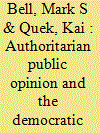

|
|
|
|
|
| Summary/Abstract |
The “democratic peace”—the regularity that democracies rarely (if ever) fight with other democracies but do fight with nondemocracies—is one of the most famous findings in international relations scholarship. There is little agreement, however, about the mechanism that underpins the democratic peace. Recently, scholars have shown that mass publics in liberal democracies are less supportive of using military force against other democracies. This finding has been taken to support the idea that the content of public opinion may provide one mechanism that underpins the democratic peace. Using a large-scale survey experiment, we show that mass publics in an authoritarian regime—China—show the same reluctance to use force against democracies as is found in western democracies. Our findings expand the empirical scope of the claim that mass publics are reluctant to use force against democracies, but force us to rethink how public opinion operates as a causal mechanism underpinning the democratic peace.
|
|
|
|
|
|
|
|
|
|
|
|
|
|
|
|
| 2 |
ID:
140918
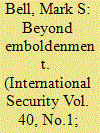

|
|
|
|
|
| Summary/Abstract |
What happens to the foreign policies of states when they acquire nuclear weapons? Despite its importance, this question has not been answered satisfactorily. Nuclear weapons can facilitate six conceptually distinct foreign policy behaviors: aggression, expansion, independence, bolstering, steadfastness, and compromise. This typology of foreign policy behaviors enables scholars to move beyond simple claims of “nuclear emboldenment,” and allows for more nuanced examination of the ways in which nuclear weapons affect the foreign policies of current and future nuclear states. The typology also sheds light on Great Britain's response to nuclear acquisition. Britain used nuclear weapons to engage in greater levels of steadfastness in responding to challenges, bolstering junior allies, and demonstrating independence from the United States, but it did not engage in greater levels of aggression, expansion, or compromise. The typology and the British case demonstrate the value of distinguishing among different effects of nuclear weapons acquisition, have implications for scholars' and policymakers' understanding of the role of nuclear weapons in international politics, and suggest avenues for future research.
|
|
|
|
|
|
|
|
|
|
|
|
|
|
|
|
| 3 |
ID:
114612
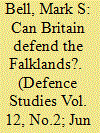

|
|
|
|
|
| Publication |
2012.
|
| Summary/Abstract |
Britain's ability to defend the Falkland Islands from Argentina has been repeatedly challenged by former military leaders and analysts. These concerns have been driven by British defence cuts, the discovery of hydrocarbon reserves close to the Falklands, and increasingly bellicose Argentine rhetoric and actions. This paper evaluates Argentina's capacity to launch an attack on the Falklands and the British capacity to defend against such an attack. Argentina's ability to threaten the Falklands is limited, because Argentina cannot easily neutralise British air superiority over the islands. Even if Argentina could do so, Argentina would find it difficult to bring sufficient troops onto the islands to threaten the Mount Pleasant airfield, or prevent British reinforcements from arriving. Although Britain's current military posture is reasonable, Britain needs a political strategy to counter an Argentine campaign of low-level harassment.
|
|
|
|
|
|
|
|
|
|
|
|
|
|
|
|
| 4 |
ID:
168564


|
|
|
|
|
| Summary/Abstract |
In an important article, McIntosh and Storey (2018) challenge the “acquisition-use presumption” that a terrorist organization with a nuclear weapon would inevitably seek to detonate it in an attack. They argue that a terrorist organization with nuclear weapons has more attractive options than conducting a direct nuclear attack, that organizational politics mean that a terrorist organization with a nuclear weapon would be unlikely to seek to detonate it, and that a nuclear attack would escalate the threats the terrorist organization faced. I argue that these arguments are ultimately unpersuasive and that the acquisition-use presumption remains a valid basis for theorizing about the likelihood of nuclear terrorism.
|
|
|
|
|
|
|
|
|
|
|
|
|
|
|
|
| 5 |
ID:
148038


|
|
|
|
|
| Summary/Abstract |
This article examines whether the quantitative literature on the causes of nuclear proliferation successfully identifies variables that explain existing patterns of proliferation or improve our ability to predict proliferation. Using extreme bounds analysis, cross-validation, and random forests, I examine 31 variables that the extant literature considers significant determinants of proliferation. While some variables perform better than others, most fail to offer strong explanations for existing patterns of proliferation. Even fewer improve our ability to predict proliferation. It follows that the existing quantitative literature on proliferation produces more tentative findings than scholars typically understand.
|
|
|
|
|
|
|
|
|
|
|
|
|
|
|
|
| 6 |
ID:
169183


|
|
|
| 7 |
ID:
193165


|
|
|
|
|
| Summary/Abstract |
This article examines the strategic decision-making of the South African regime between 1975 and 1989. Existing scholarship argues that Pretoria was a regional hegemon and that this position underwrote its security strategy. We suggest that scholars have overstated the implications of its regional strength. Using archival documents and interviews with retired military and political elites, we show how Pretoria’s threat perception, conventional military operations, and nuclear strategy were in fact conditioned by an awareness of the limits of its power within the global distribution of power; its isolation in the international system; and fears of conflict escalation vis-à-vis extra-regional threats.
|
|
|
|
|
|
|
|
|
|
|
|
|
|
|
|
| 8 |
ID:
165091
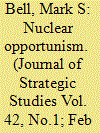

|
|
|
|
|
| Summary/Abstract |
How do states use nuclear weapons to achieve their goals in international politics? Nuclear weapons can influence state decisions about a range of strategic choices relating to military aggression, the scope of foreign policy objectives, and relations with allies. The article offers a theory to explain why emerging nuclear powers use nuclear weapons to facilitate different foreign policies: becoming more or less aggressive; providing additional support to allies or proxies, seeking independence from allies; or expanding the state’s goals in international politics. I argue that a state’s choices depend on the presence of severe territorial threats or an ongoing war, the presence of allies that provide for the state’s security, and whether the state is increasing in relative power. The conclusion discusses implications of the argument for our understanding of nuclear weapons and the history of proliferation, and nonproliferation policy today.
|
|
|
|
|
|
|
|
|
|
|
|
|
|
|
|
| 9 |
ID:
192019
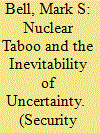

|
|
|
|
|
| Summary/Abstract |
The nuclear taboo—a strong normative inhibition on the use of nuclear weapons—is one of the most important concepts in the study of nuclear weapons.Footnote1 In the last few years, however, the idea of the taboo has come under attack. Notably, a series of studies have shown that mass publics appear quite comfortable with using nuclear weapons.Footnote2 When given hypothetical scenarios in which nuclear use might be considered, publics appear willing to use nuclear weapons, and concerns about (im)morality appear to weigh less heavily than narrow assessments of military utility. In the latest contribution to this research agenda, Janina Dill, Scott D. Sagan, and Benjamin A. Valentino (hereafter DSV) demonstrate that not only Americans appear comfortable with nuclear use.Footnote3 Surveying publics in France, Israel, the United Kingdom, and the United States, they show similar patterns in each country: respondents are surprisingly willing to use nuclear weapons and appear responsive to assessments of military utility. Scholars previously raised the possibility that US publics might be unusual as a caveat qualifying prior findings.Footnote4 DSV’s argument and evidence thus represent an important contribution, showing that prior findings can in fact be replicated across a range of democracies.
|
|
|
|
|
|
|
|
|
|
|
|
|
|
|
|
|
|
|
|
|